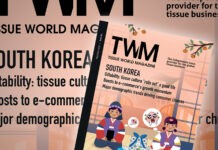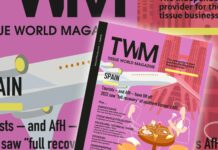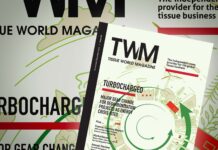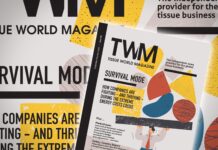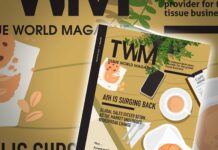As the industry focuses on the major event in the trade show calendar at Tissue World Barcelona 2013 in March, at long last there are signs of strongly rooted green shoots of recovery in the global economy.
The US ‘fiscal cliff’ has been avoided for the time being, the eurozone appears to be in safer hands than a year ago and China looks to have avoided the hard landing predicted by many.
TW took the decision to visit Portugal with Barcelona in mind and as a geographical comparison with December and January’s country report on Spain. With some foreboding, it must be said, as the country’s T&T performance is not stellar. But what we found might be described as an object lesson in survival. Its tissue market is proof that even in economically turbulent times, many of those in the industry can grit their teeth, batten down the hatches and get on with business.
As Helen de Castro, the Brazilian-born director of Fapajal in Lisbon, put it after pointing to an impressive series of expansion plans which she has had to put on hold due to the downturn: “There is light at the end of the tunnel, but it’s a very dim light.”
And this is why: national unemployment at 17%; retail tissue value sales down 4% last year; government cranking up austerity measures; major debt restructuring; T&T machines all on the narrow end of the trim range; average mill production on the low side by EU comparison at less than 50,000 mt/yr; machine technical age lower than average at 16 years.
But there are plusses: a small cost advantage over bigger nations with a mix in Portugal’s mills of 60/40 recycled fibre to market virgin pulp; private label products gaining most from the economic malaise with 49% tissue value sales in 2008, on a par with the EU average, rising to 64% now; strong localised production; and progressive management looking for every opportunity to diversify and innovate.
Hence you can read about the “the sexiest toilet paper on earth” made at the Renova mill in Torres Novas, and two companies aggressively pushing their sales boundaries.
The tissue industry has reacted to the financial woes by becoming leaner and more cost effective. While only the fittest will survive, in many cases market conditions have helped foster creativity. TW found that there are still plenty of opportunities for differentiation and innovative risk taking, at home and as far afield as former colony Brazil and also in northern Africa and the UK. Flexibility links the two companies both in terms of the variety and speed of production.
There’s a chance that the dim light at the end of the tunnel may soon be getting brighter. In return for government austerity measures, Portugal’s stronger neighbours and the European Central Bank have an obligation to underwrite the country’s debt. So Portugal’s cost position suggests it may be poised to enjoy growth again as the rest of the EU and its own economy improves over the longer term. But for now, all eyes are on the inspiring efforts of its producers as they strive to offer sustainable and innovative products despite the tough times.


























